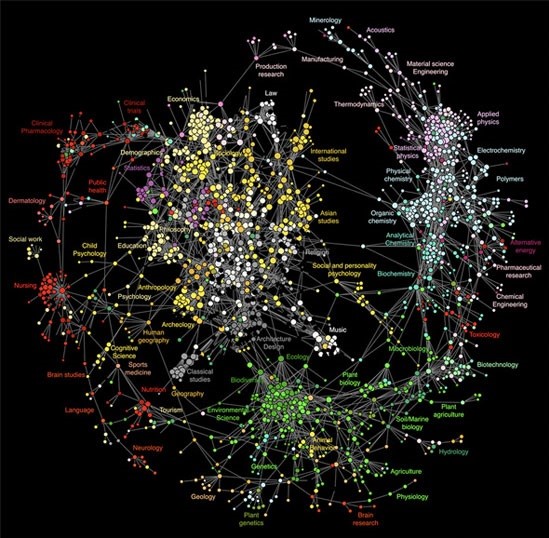How Scientific Disciplines Connect to Unify Our Knowledge
Ever wondered how scientific disciplines connect to reveal the universe? From the study of atoms to the study of galaxies; they’re just different points on the same spectrum. Physics, chemistry, biology, evolutionary psychology, social psychology, anthropology, ecology and all other fields of science are divided in ways that make it easier for us to study them and more comprehensible for us to understand. Atomic physics is not separate from chemistry just as chemistry is not separate from biology; both fields study atoms but on two different scales. Science is our best tool for understanding how the universe works. Therefore, the grand synthesis of understanding the universe requires a unification of scientific knowledge.
Unifying the Scientific Disciplines
How Scientific Disciplines Connect: Physics to Chemistry to Biology
Making all the connections for adjacent fields of science is easier for some fields and more difficult for others. Atomic physics studies electrons as they move around the nucleus of an atom and what happens as a result. It’s the bedrock of how matter behaves. Chemistry studies how atoms interact with other atoms by forming and breaking bonds and what happens as a result. Chemistry is just physics but zoomed out some.
Understanding how scientific disciplines connect gets trickier when trying to connect chemistry to biology. Think of a single cell: its membranes, proteins, and DNA are all molecular machines, built from atoms following chemical rules. There are billions of chemical reactions driving life, causing a tremendous leap in scale from individual chemical reactions to living systems, but subfields like biochemistry bridge the gap. But no matter how you look at it, all of biology is still grounded in chemistry. Biology studies how certain chemicals organize and interact with each other to make life happen. Evolutionary biology studies how chemicals got into the specific arrangements, like the double helix of DNA, that make life possible and how those arrangements change over time.
Every strand of life traces back to atoms, shuffled and reshuffled by chemical laws. Seeing these connections reveals a continuum: physics lays the groundwork, chemistry builds the structures, and biology animates them into life. Each step up the ladder adds complexity, but the roots stay the same.
Connecting Biology to Psychology and Ecology
The same connections can be done for all other fields of science. The jump from biology to evolutionary psychology is probably the most difficult because that depends on understanding how the brain creates thoughts, feelings, urges, desires and so on. That does not mean the jump is impossible to make, it just means it’s difficult for some people to understand how the jump can be made. Evolutionary psychology studies how the mind works, and the mind is the product of the brain, which is a biological organ. The brain was created by genes, which are units of chemistry all composed entirely of atoms. There has never been a single function or property of the brain observed or discovered that did not obey well established laws of chemistry. It is just that there are so many combinations of complicated chemical reactions happening inside the brain that trying to understand the functioning of the brain in terms of chemistry makes the task impossible for us. A person would die of old age before he could map out a chemical formula for the brain, and even if it was possible to do so it would be completely worthless since nobody else would be able to use it or understand what it meant or how it worked.
All human behavior is a function of the design of human brains. As a social species, we are constantly interacting with each other in the ongoing struggle for survival and reproduction. Social psychology studies how brains and minds of humans interact with other brains and minds while in groups. We share this planet with not only humans but with all other species. Ecology studies how groups of biological organisms interact with themselves and their environment. Ultimately, every field of science is just a specialized field of atomic physics. The trick to a unification of scientific knowledge is using first principles to connect to make fluid transitions between adjacent scientific fields and then build up a body of information from there.
The Power of a Unified Scientific View

Source: climate.gov
So, what does it all mean? Understanding how scientific disciplines connect isn’t just an academic exercise, it’s a roadmap to seeing the universe as a single, intricate tapestry. Physics gives us the building blocks with atoms and electrons. Chemistry stitches those blocks into molecules. Biology takes it further, showing how life emerges from those chemical foundations. Evolutionary psychology and ecology then reveal how brains, behaviors, and ecosystems all trace back to the same atomic roots. It’s a chain reaction of knowledge, each link illuminating the next, proving that no field stands alone.
One goal of this web site is to explore how scientific disciplines connect, from atoms to ecosystems, and use that knowledge to improve our lives and society. This unification matters beyond theory. Consider climate change. Physics explains how the energy trapped by greenhouse gases is warming the Earth. Chemistry tracks the carbon cycling through the air, soil, and oceans. Biology reveals how rising temperatures stress coral reefs or shift migration patterns. Psychology digs into why humans resist change by explaining fear, denial, or short-term thinking, while ecology predicts how ecosystems might collapse or adapt. Solving it demands that we pull all these threads together, not just in theory but in action That’s at the heart of this blog: to bridge these fields and make their insights actionable. Whether it’s improving society, rethinking history, or simply marveling at nature’s complexity, a unified science offers clarity in thought and in action.
Further reading: Consilience by E.O. Wilson; A Short History of Nearly Everything by Bill Bryson

This is probably the most interesting piece ive read all week. Definitely got me curious! Ive subscribed to your blog 🙂
I never thought about how all of the different branches of science are connected. But I guess, since they are called branches, they belong to the same tree. It’s fun to see how they are all tied to each other.
Very interesting and thought provoking. Thank you for sharing in a way that anyone can understand.
I’ve never been a science girl, but this post I actually found very interesting! Thanks for sharing your valuable knowledge with all of us!
Absolutely fascinating. Really – it makes me think about how complex we really, truly are.
“Ultimately, every field of science is just a specialized field of atomic physics” Interesting! Definitely food for thought.
Ooooo now this is one interesting topic! It’s crazy how different things can be yet totally relate to one another
I find it interesting that we focus so often on dividing science that we forget how connected we really are . . . of the same tree. Thanks for the revelation!
That’s quite an interesting and informative post to read!
This is a very interesting and thought-provoking post and I appreciate that you shared with us. The funny thing, I am reading a book by Dr. Pemberton where he’s explaining that we are all connected and now I am making a parallel with your post.
until nursing school, I didn’t realize how connected everything was. I’m really enjoying your blog!
I find this post very fascinating. I like how the various sectors are linked. This topic will interest my husband, sharing!
This is definitely interesting, and makes sense. My sister is a science major and I hear here telling me similar ideas!
Very nice explained how all branches are connected. To certain degree, I believe that how the human beings survive.
Quite interesting and informative post . Thank you.
Great and enlightening read. Thanks for sharing!
Was it really true that the human behavior is a function of the design of human brain..? 😂So this will be my excuse of being a forgetful person.. Haha
This is informative
Interesting piece! Definitely kept me wanting for more.
Such an informative and interesting post. I love science so much. I really enjoyed reading this.
Great post, I really enjoyed reading this, so informative, I really loved science and this gives me something new to learn.
Very interesting read – I’ve been reading a few scientific books lately (like Neil DeGrasse!) and loving it
Excellent synopsis! Unfortunately, I see a lot of silos in the scientific world. Researchers get so ingrained in their field of study, they can lose sight of how their area interacts with others. This is especially true when trying to integrate more existential aspects such as psychology and human reactions.
This post definitely made me do some thinking, very interesting.
This makes perfect sense.. I really love reading anything about science.. And I love the way you write things. It’s entertaining.
This is such an informative post and science has always intrigued me so much. i really enjoyed reading it.
Science can be an engaging subject, and facets of it is pretty mindblowing. When we think about the human body alone, and how it functions with a keen intelligence that keeps us alive and our brains ticking, one must be in awe of it all.
Scientific Knowledge is always so inspiring!!!! I used to love all my science classes!